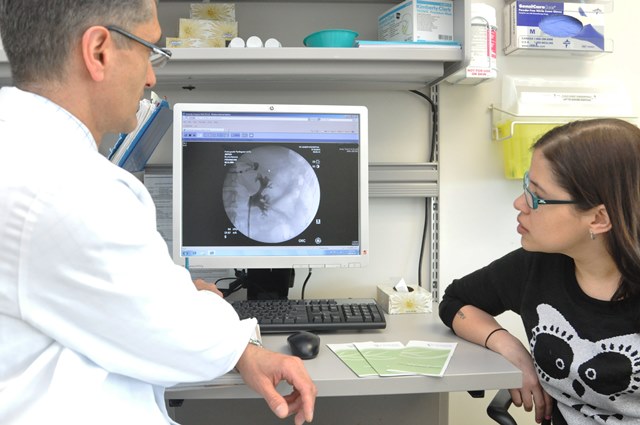
The excruciating pain has often been compared to childbirth, and at some point in their life one in 10 Canadians will experience it. They will have a kidney stone. Stacey O’Neill had her first kidney stone when she was just 18. Since then she’s suffered numerous stones and the surgeries to remove them. “I’ve had so many stones I’ve lost count,” says the now 30-year-old.
Half of those like O’Neill who develop stones will have more than one, which can indicate more serious health problems. “If a patient has multiple kidney stones, or they form certain types of stones this could mean they have an underlying problem with their diet or body metabolism,” explains Dr. Hassan Razvi, chair/chief of urology at St. Joseph’s Hospital in London.
To treat patients with recurring stones Dr. Razvi and his multidisciplinary team in St. Joseph’s Urology Centre have established a kidney stone prevention clinic, the first of its kind in Canada. Through the clinic patients are assessed in a single appointment by a nephrologist – a specialist with expertise in medical conditions that affect the kidneys – a urologist for surgical and treatment consultation, and a registered dietitian.
MORE: POINT OF CARE INR TESTING
“Most kidney stones can be prevented through a combination of medication, diet, fluid intake and other lifestyle changes,” says Dr. Razvi. “Prevention and treatment plans are determined based on the cause and type of stones.” Patients are also evaluated on their medical and diet history, blood tests and urine samples taken over a 24 hour period. When medication may play a role in a patient’s prevention, nephrologist Dr. Nabil Sultan selects the best option and monitors the patient and the treatment’s effectiveness.
In O’Neill’s case, medication has helped decrease the frequency of her kidney stones letting her lead a “more normal” life. Treatment in the clinic has also improved her outlook on her condition, “Having a chronic illness, although I don’t like calling it that because I don’t feel sick most of the time, can get depressing. Dr. Razvi and his team have been very supportive and have helped me learn to deal with my illness.”
St. Joseph’s has a long history of innovative advances in the treatment and diagnosis of kidney stones. In 1990 St. Joseph’s became the second hospital in Ontario to offer shock wave lithotripsy, a non-invasive way to break up kidney stones. The service quickly became the busiest in the world, and today treats more than 1,300 patients a year. In 1993, St. Joseph’s urologists were the first to treat a human for kidney stones using a holmium laser, a treatment now used around the world.
“St. Joseph’s treats a large number of patients for kidney stones, many of them complex cases, and we recognized a great need for a comprehensive prevention clinic,” says Dr. Razvi. “As an academic teaching hospital this clinic also provides opportunities for future research into the causes of kidney stones and potentially new treatments.”
MORE: THE WAR AGAINST SUPERBUGS
The clinic has also improved access to care and the experience of patients like O’Neill. “Being able to come to this clinic and see all the care providers I need in one day is very convenient and means less time away from my work and my life.”


Comments are closed.